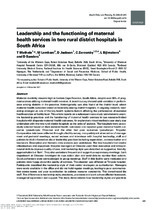| dc.contributor.author | Lembani, M. | |
| dc.contributor.author | Jackson, D. | |
| dc.contributor.author | Zarowsky, C. | |
| dc.contributor.author | Bijlmakers, L. | |
| dc.contributor.author | Sanders, David | |
| dc.contributor.author | Mathole, Thubelihle | |
| dc.date.accessioned | 2018-07-17T07:40:17Z | |
| dc.date.available | 2018-07-17T07:40:17Z | |
| dc.date.issued | 2018 | |
| dc.identifier.citation | Mathole, T. et al. (2018). Leadership and the functioning of maternal health services in two rural district hospitals in South Africa. Health Policy and Planning, 33: ii5–ii15 | en_US |
| dc.identifier.issn | 1460-2237 | |
| dc.identifier.uri | http://dx.doi.org/10.1093/heapol/czx174 | |
| dc.identifier.uri | http://hdl.handle.net/10566/3887 | |
| dc.description.abstract | Maternal mortality remains high in Eastern Cape Province, South Africa, despite over 90% of pregnant
women utilizing maternal health services. A recent survey showed wide variation in performance
among districts in the province. Heterogeneity was also found at the district level, where
maternal health outcomes varied considerably among district hospitals. In ongoing research, leadership
emerged as one of the key health systems factors affecting the performance of maternal
health services at facility level. This article reports on a subsequent case study undertaken to examine
leadership practices and the functioning of maternal health services in two resource-limited
hospitals with disparate maternal health outcomes. An exploratory mixed-methods case study was
undertaken with the two rural district hospitals as the units of analysis. The hospitals were purposively
selected based on their maternal health outcomes: one reported good maternal health outcomes
(pseudonym: Chisomo) and the other had poor outcomes (pseudonym: Tinyade).
Comparative data were collected through a facility survey, non-participant observation of management
and perinatal meetings, record reviews and interviews with hospital leadership, staff and
patients to elicit information about leadership practices including supervision, communication and
teamwork. Descriptive and thematic data analysis was undertaken. The two hospitals had similar
infrastructure and equipment. Hospital managers at Chisomo used their innovation and entrepreneurial
skills to improve quality of care, and leadership style was described as supportive, friendly,
approachable but ‘firm’. They also undertook frequent and supportive supervisory meetings. Each
department at Chisomo developed its own action plan and used data to monitor their actions.
Good performers were acknowledged in group meetings. Staff in this facility were motivated and
patients were happy about the quality of services. The situation was different at Tinyade hospital.
Participants described the leadership style of their senior managers as authoritarian. Managers
were rarely available in the office and did not hold regular meetings, leading to poor communication
across teams and poor coordination to address resource constraints. This demotivated the
staff. The differences in leadership style, structures, processes and work culture affected teamwork,
managerial supervision and support. The study demonstrates how leadership styles and practices influence maternal health care services in resource limited hospitals. Supportive leadership manifested
itself in the form of focused efforts to build teamwork, enhance entrepreneurship and in
management systems that are geared to improving maternal care. | en_US |
| dc.language.iso | en | en_US |
| dc.publisher | Oxford University Press | en_US |
| dc.rights | VC The Author(s) 2018. Published by Oxford University Press in association with The London School of Hygiene and Tropical Medicine.
This is an Open Access article distributed under the terms of the Creative Commons Attribution License (http://creativecommons.org/licenses/by/4.0/), which permits
unrestricted reuse, distribution, and reproduction in any medium, provided the original work is properly cited. | |
| dc.subject | Leadership | en_US |
| dc.subject | Maternal health | en_US |
| dc.subject | Health systems | en_US |
| dc.subject | Obstetric care | en_US |
| dc.subject | Managers | en_US |
| dc.subject | South Africa | en_US |
| dc.subject | District hospital | en_US |
| dc.title | Leadership and the functioning of maternal health services in two rural district hospitals in South Africa | en_US |
| dc.type | Article | en_US |
| dc.privacy.showsubmitter | FALSE | |
| dc.status.ispeerreviewed | TRUE | |

